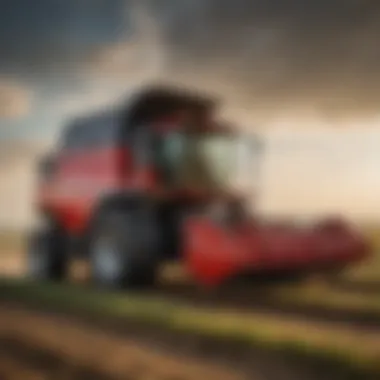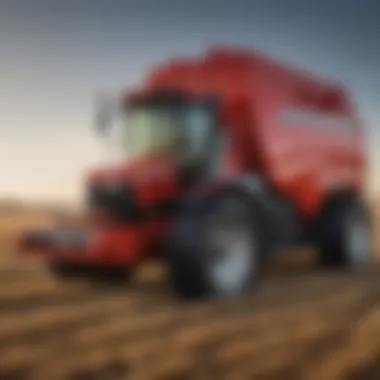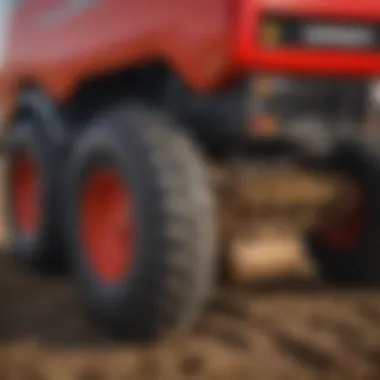Massey Ferguson 1734 Baler: In-Depth Review and Insights


Intro
The Massey Ferguson 1734 baler has become a significant tool in the agricultural sector, valued for its robust design and operational efficiency. This article explores the various aspects of the baler, including its features, capabilities, and applications in modern farming practices. As large-scale agriculture evolves, understanding the importance of such machinery helps farmers and agronomists make informed decisions about equipment investments.
Key Concepts and Terminology
Basic Definitions
In order to fully appreciate the Massey Ferguson 1734 baler, it is crucial to familiarize oneself with some basic terms. A baler is a machine designed to compress and package agricultural materials like hay or straw into manageable bales. Bales can take various shapes and sizes, but the purpose remains the same: to facilitate handling, storage, and transport of these materials.
Historical Context
Understanding the historical development of balers can provide insights into why the Massey Ferguson 1734 is a preferred choice today. Early balers were mechanically simple, but advancements in technology have led to more efficient and effective designs. Massey Ferguson, as a brand, has been at the forefront of agricultural machinery innovation for decades, leading to the creation of models like the 1734, which incorporates both user-centric design and cutting-edge technology.
Recent Innovations and Trends
Technological Advancements
The Massey Ferguson 1734 baler stands out due to its incorporation of recent technological advancements. Features such as automation and enhanced sensors improve performance and reduce operational costs. For instance, the advanced knotting system ensures that bales are secure, minimizing the risk of failures during handling.
Sustainable Practices
Modern farming is increasingly focused on sustainability. The 1734 model contributes to these goals by optimizing resource use. This machine is designed to operate efficiently, which minimizes fuel consumption and reduces carbon emissions. Farmers looking to align with environmental best practices will find the features of this baler appealing.
Practical Applications and Techniques
Step-by-step Guides
To maximize the use of the Massey Ferguson 1734, it is important to understand proper operational techniques. Here are some key steps:
- Preparation: Ensure the baler is properly calibrated according to the type of material.
- Loading: Feed the material evenly to avoid jams and ensure consistent bale sizes.
- Monitoring: Keep an eye on the baler’s functions during operation; this might help spot potential issues early.
- Maintenance: Regularly service the baler to maintain its efficiency.
Case Studies
Several farmers have shared their experiences with the Massey Ferguson 1734. A case study from a farm in Wisconsin showcases a 15% increase in productivity since adopting this baler. Farmers noted significant improvements in bale quality and reduced downtime due to its reliable components.
"The Massey Ferguson 1734 has transformed our operations. The speed and efficiency are remarkable, allowing us to focus on other tasks without worry." – A Wisconsin farmer.
Preamble to the Massey Ferguson Baler
The Massey Ferguson 1734 baler stands as a significant machine in the agricultural landscape, designed to facilitate efficient hay and straw management. Understanding its role is essential for farmers and agricultural professionals seeking to enhance productivity. This introduction will provide insights into balers such as the Massey Ferguson 1734, outlining their importance in modern farming operations.
Overview of Balers in Agriculture
Balers play a critical role in the agricultural process. They compress and wrap crop materials into compact bales, changing how farmers handle, store, and transport forage. This machinery is indispensable, particularly in regions with extensive hay and crop production. The Massey Ferguson 1734 baler exemplifies the advance in technology, combining efficiency with reliability. The mechanical design of balers allows for the quick and systematic gathering of crops, ensuring minimal wastage.
Farmers rely on balers to achieve various objectives:
- Time savings: The process is streamlined, allowing large fields to be baled quickly.
- Enhanced storage: Baling crops preserves their quality and makes them easier to store.
- Improved transport: Compact bales take up less space, optimising logistics and reducing transport costs.
In summary, the role of balers like the Massey Ferguson 1734 is paramount in achieving operational efficiency and sustainability within farming.
Purpose of the Article
The primary purpose of this article is to provide a comprehensive analysis of the Massey Ferguson 1734 baler. It will not only delve into its design and operational features but also explore its performance in various agricultural settings. By offering detailed insights, this article aims to equip farmers and agronomists with knowledge that can guide their equipment choices. Key aspects include performance metrics, user experiences, and comparisons with similar models in the market.
This analysis will also address the maintenance needs and costs associated with the Massey Ferguson 1734 baler.
The insights gained from this article will serve as a valuable resource for anyone considering investments in such agricultural machinery.
Design Features of the Massey Ferguson Baler
The design features of the Massey Ferguson 1734 baler are crucial aspects that contribute significantly to its overall performance and functionality. A baler's design can dictate its efficiency, usability, and durability in the field. This section will explore key elements such as the baler's dimensions, engineering specifications, and the quality of materials used, all of which are essential for understanding its capabilities in modern agriculture.
Compact Structure and Dimensions
The Massey Ferguson 1734 baler has a compact structure that is specifically designed to enhance maneuverability. Its dimensions allow it to navigate narrow paths and tight spaces often found in farms, especially those with mixed cropping systems. The baler's size is not just about fitting into spaces; it also contributes to operational efficiency. Having a smaller footprint means less soil compaction and reduced damage to crops during harvesting.
Farmers appreciate that a compact baler can be easily transported and stored, which is an important factor for those with limited space. Its lightweight build enables quick setup and movement from field to field, reducing downtime. Thus, the design of the 1734 baler ultimately translates to better productivity.
Engineering Specifications


The engineering specifications of the Massey Ferguson 1734 baler reflect years of innovation and farmer feedback. It is equipped with advanced technology such as a high-capacity pickup and an efficient feed system. These features minimize the chances of blockages and ensure consistent flow of materials into the baler, leading to higher quality bales.
Moreover, the machine's powerful compression system allows it to produce dense bales, which are easier to handle and transport. The integration of precision engineering ensures that each part works in harmony, maximizing the overall efficiency of the baling process. Specifications like these play a crucial role in making the Massey Ferguson 1734 a reliable tool for farmers.
Material Quality and Durability
Material quality is an essential consideration in the design of the Massey Ferguson 1734 baler. Built with robust materials, this baler is designed to withstand harsh operating conditions. Durability is crucial; farmers need equipment that can endure frequent use throughout various seasons without significant wear and tear.
The use of high-grade steel for critical components contributes to the machine’s longevity. Additionally, the design includes weather-resistant features that protect sensitive parts from the elements. This emphasis on quality reduces the likelihood of failures and costly repairs, ultimately enhancing the economic impact of the investment.
"A baler's design features are not merely aesthetic; they are deeply functional, aimed at improving the efficiency of agricultural operations."
Operational Efficiency
Operational efficiency in the context of the Massey Ferguson 1734 Baler is crucial for maximizing productivity and ensuring the smooth functioning of agricultural practices. Highly efficient balers contribute to lower operational costs and improved effectiveness in managing crop materials. Understanding specific performance metrics, the variety of baling techniques utilized, and how the equipment adapts to different farming conditions enhances the value of this analysis.
Performance Metrics
Performance metrics provide a measurable framework for evaluating the effectiveness of the Massey Ferguson 1734 Baler. Important metrics include:
- Bale density: Higher density bales are easier to handle and transport, reducing shipping costs.
- Throughput: This is the amount of material processed over a given period. High throughput signifies that the baler can operate efficiently within a busy farming season.
- Fuel efficiency: This metric evaluates fuel consumption concerning the output produced, with lower fuel use being ideal for reducing operational costs.
Monitoring these metrics helps farmers identify optimal performance and any necessary adjustments for enhanced efficiency.
Baling Techniques Utilized
The Massey Ferguson 1734 incorporates several advanced baling techniques which are critical for its operational efficiency. These techniques include:
- Twine and net wrapping: Both options are available, enabling farmers to select the best choice based on their specific needs and practices.
- Variable chamber technology: This allows for customization of bale sizes, accommodating different crops and market demands.
- Auto-greasing systems: These ensure that vital components receive adequate lubrication, resulting in reduced wear and tear, which can otherwise lead to downtime and increased maintenance costs.
Understanding and utilizing these techniques can significantly streamline the baling process, ensuring that farmers can efficiently manage their crop residue without excessive labor or resource input.
Implementation in Different Farming Conditions
The versatility of the Massey Ferguson 1734 Baler allows for effective implementation in various farming conditions. It can operate efficiently in:
- Dry, hard materials: These conditions may present challenges but the baler's advanced technology enables effective compression and wrapping.
- Moist or soft crops: The unit is designed to handle moisture variation, preventing clogging and ensuring consistent bale quality.
- Uneven terrain: The stable design of the Massey Ferguson 1734 minimizes issues related to terrain variations, thus enabling farmers to work efficiently in different landscapes.
Each of these factors contributes to the overall operational efficiency, making the Massey Ferguson 1734 a reliable choice across diverse agricultural environments.
Key Features that Enhance Usability
The usability of any agricultural machine is crucial for maximizing efficiency and productivity. The Massey Ferguson 1734 baler is no exception. In this section, we will discuss how various features contribute to its user-friendliness, ensure operational flexibility, and support a broad range of crop types. Understanding these elements can help farmers make informed decisions regarding equipment selection based on usability outcomes.
User-Friendly Controls
One of the standout features of the Massey Ferguson 1734 baler is its user-friendly control system. The layout of controls is intuitive, allowing operators to quickly learn how to use the baler effectively. The inclusion of color-coded buttons and easily readable display screens minimizes the learning curve. This means less downtime spent on training, which is a critical aspect during the busy harvesting season.
Adjustable settings for pressure and density are clearly presented, simplifying the process of customizing the baler's operation to meet specific farming needs. Additionally, the ease of operation enables even novice users to handle the machine with confidence.
Versatile Baling Options
Versatility is another essential characteristic of the 1734 baler, offering a variety of baling options that cater to different crop types and operating conditions. It is designed to handle hay, straw, and silage effectively. Operators can switch between round and square bales depending on their requirements.
This adaptability allows farmers to optimize their work according to market demands. It also reduces the need for multiple machines, which can be a significant cost-saving factor. The ability to produce bales in different sizes can meet diverse storage and transportation needs.
Adaptability to Different Crop Types
The Massey Ferguson 1734 baler demonstrates its capability to function across a range of crops. This adaptability is particularly important for agriculturalists who may work with different types of forage throughout the season.
The baler is equipped to handle various moisture levels and crop densities without compromising performance. This ensures that farmers can achieve the desired quality of their bales, which is vital for feed value and marketability.
Moreover, the machine’s design incorporates features that allow for easy modifications to accommodate local farming practices, enhancing its usability even further.
"A machine that adapts to your needs plays a significant role in the efficiency of your farming operations."
By focusing on these key usability features, the Massey Ferguson 1734 baler stands out in the agricultural sector. Its user-friendly controls, versatile baling options, and ability to adapt to different crops make it a crucial tool for farmers looking to improve their operational efficiency.
Maintenance and Care for the Massey Ferguson Baler
Caring for the Massey Ferguson 1734 baler is essential for ensuring its operational longevity and efficiency. Maintaining the equipment not only prevents costly breakdowns but also ensures that the machine operates at its optimal capacity. A well-maintained baler will produce higher quality bales and reduce wastage, providing economic benefits for the farmer.
Routine Maintenance Practices


Regular maintenance is critical for keeping the Massey Ferguson 1734 in top shape. Here are key practices:
- Inspecting Belts and Chains: Regular checks on the belts and chains help prevent unexpected failures during operation.
- Lubrication: Use the recommended lubricants on moving parts to reduce friction and wear.
- Cleaning Mechanisms: Keeping the baler clean from debris and residue ensures that it operates without obstruction.
- Hydraulic Fluid Levels: Ensure that hydraulic systems are regularly checked for fluid levels and leaks.
Regular maintenance can extend the life of the baler significantly, saving time and money in the long run.
Common Issues and Troubleshooting
Familiarity with common issues and their solutions can greatly enhance the operational reliability of the Massey Ferguson 1734. Some issues include:
- Bale Jamming: This can occur due to foreign objects or uneven feeding. Solutions include regular cleaning and ensuring proper feeding techniques.
- Hydraulic Problems: If the baler does not operate smoothly, there may be issues with hydraulic connections or fluids.
- Electrical Faults: Worn wiring can cause malfunctions. Regular inspections can preemptively address these faults.
Common troubleshooting steps involve checking for visible wear, known faults, and consulting the machine's manual for specific guidelines.
Cost of Maintenance
Understanding the costs associated with maintaining the Massey Ferguson 1734 baler is paramount for budgeting. Routine maintenance can involve:
- Replacement Parts: Occasional replacements of parts such as belts and hydraulic hoses.
- Service Costs: Professional servicing might be required, especially for complex issues.
- Labor Costs: If farmers opt to hire help, labor can add substantially to maintenance costs.
Overall, effective maintenance leads to lower operational costs, making it a worthy investment for farmers in the long term.
Operational Costs and Economic Impact
Understanding the operational costs and economic impact of the Massey Ferguson 1734 Baler is essential for farmers who aim to maximize efficiency and effectiveness within their agricultural practices. The costs associated with owning and operating a baler significantly affect the profitability of farming operations. This section will highlight specific elements such as initial investments, upkeep and maintenance expenses, and the benefits of implementing such equipment in daily farming activities.
Cost-Benefit Analysis
When considering the Massey Ferguson 1734 Baler, it is crucial to conduct a thorough cost-benefit analysis. This involves examining the initial purchase price of the baler and comparing it to the long-term savings it can provide through efficiency and performance. Factors to analyze include:
- Initial Investment: The purchase price of the Massey Ferguson 1734 Baler is a significant upfront cost, but it is necessary to consider it in the context of its durability and lifespan.
- Fuel Efficiency: This baler is designed to operate efficiently, which can result in lower fuel costs. Owning a fuel-efficient machine can yield considerable savings over various operations.
- Labor Costs: The user-friendly design of the Massey Ferguson 1734 can reduce the manpower required to operate it, thus decreasing ongoing labor costs.
- Yield Quality: Quality bales lead to better market prices. A well-designed baler can produce superior bales, enhancing the overall profitability.
A detailed cost-benefit analysis provides a clearer picture, assisting farmers in making informed decisions. It highlights how the initial costs are an investment toward greater productivity and profits in the long run.
Long-Term Investment Perspective
Taking a long-term investment perspective is critical when evaluating the Massey Ferguson 1734 Baler. While the purchase price may seem high initially, the long-term returns often justify this expense. Consider the following aspects:
- Durability and Reliability: The Massey Ferguson brand is known for its robust machinery. Investing in a durable baler means that farmers can expect reliable operation for many years.
- Resale Value: High-quality agricultural equipment tends to retain its value better than cheaper alternatives. Farmers can evaluate the potential return on investment when it’s time to sell.
- Adaptation to Farm Expansion: The scalability of the Massey Ferguson 1734 allows it to remain relevant as farming operations grow. An effective baler will accommodate larger workloads, thus continuing to support profitability.
Through careful consideration of these factors, farmers who invest in the Massey Ferguson 1734 Baler can position themselves for long-term success and sustainability in their operations.
"Making informed decisions about machinery investments is crucial for achieving sustainable farming practices."
Farming is an ever-evolving field, and so the analysis included in this section aims to inform the reader of the potential positive economic impacts related to acquiring and using the Massey Ferguson 1734 Baler.
User Experiences and Testimonials
User experiences and testimonials play a crucial role in understanding the practical value of the Massey Ferguson 1734 baler. These insights give potential buyers and current users perspectives that are not easily gathered from specifications or marketing material alone. Personal experiences from contemporary users help illustrate both the benefits and limitations of the machine in real farming situations. This section aims to bring forth specific narratives and expert opinions to provide a more rounded view of the baler's performance, enhancing credibility in its operational use.
Case Studies from Farmers
Several case studies provide meaningful insights into how the Massey Ferguson 1734 performs in the field. Farmers often share their accounts on forums and social media platforms like reddit.com, detailing their day-to-day experience with this baler. For instance, a farmer in the Midwest reported significant efficiency improvements after switching to the Massey Ferguson 1734. They observed a notable reduction in downtime thanks to its reliable mechanisms and user-friendly controls. This farmer highlighted how easy it was to adapt the machine to various crop types without compromising the quality of bales produced.
Another farmer specializing in forage production noted that the Massey Ferguson 1734 has outperformed their previous baler in terms of capacity and speed. They commented on how the compact size of the baler allowed them maneuverability in smaller fields, which is not always a feature in larger balers. This versatility combined with the baler’s adaptability to different moisture conditions proved invaluable during peak harvesting times.
Importantly, these case studies suggest that the Massey Ferguson 1734 is not just about performance. Farmers also noted the importance of the support system provided by the Massey Ferguson network, which includes responsive customer service and ample resources for troubleshooting, further reducing operational stress.
Expert Opinions on Performance
Expert opinions provide an extra layer of validation to user experiences. Agricultural machinery experts have conducted independent reviews that often resonate with farmer testimonials. Many professionals point out that the Massey Ferguson 1734 stands out in terms of engineering reliability and user experience. According to a report from Machinery Pete, a trusted source for machinery evaluation, the industry consensus supports claims of lower maintenance costs and ease of parts replacement compared to competing models.
Experts also laud its adaptability for various users—from small-scale farms to larger agricultural operations. They note that while the Massey Ferguson 1734 excels in efficiency, it also addresses the requirements of sustainability. Innovations that reduce fuel consumption while maintaining high output rates have been emphasized in several agriculture technology forums.
"The Massey Ferguson 1734 is not just a baler; it's an investment in productivity and reliability that pays off over time." - Agricultural Machinery Expert
Agronomists and machinery reviewers have also pointed out that user feedback frequently aligns with their findings. This collective agreement among professionals and farmers strengthens the reputation of the Massey Ferguson 1734 as a reliable choice in the modern agricultural landscape.
In summary, user experiences and expert opinions combine to create a well-rounded perspective on the Massey Ferguson 1734. As the agricultural sector evolves, the importance of integrating user feedback with expert analysis becomes crucial in making informed decisions regarding equipment investments.
Comparative Analysis with Other Baling Equipment
A comparative analysis with other baling equipment is crucial when evaluating the Massey Ferguson 1734 Baler. This section outlines how different models articulate their effectiveness in various agricultural settings. Farmers and equipment enthusiasts benefit from knowing the unique features, limitations, and performance metrics relative to competitor products.


Understanding various balers on the market aids in the decision-making process. It highlights the Massey Ferguson 1734's capabilities while underscoring competitive advantages or drawbacks in several key areas. This analysis informs potential buyers and helps establish benchmarks for performance, usability, and cost-effectiveness, leading to smarter equipment investments.
Competitor Models Overview
In the market for agricultural balers, several models stand alongside the Massey Ferguson 1734. Competitive brands such as John Deere's 459E Baler and New Holland's Roll-Belt 450 offer notable features that demand attention.
- John Deere 459E: Recognized for its durability and ease of use, this baler provides a robust design aimed at larger operations. Its low maintenance requirement and high capacity make it appealing but may lack some advanced operational technologies present in the Massey Ferguson 1734.
- New Holland Roll-Belt 450: This model shines in versatility, supporting various crop types efficiently. However, it may not achieve the same level of compactness that the Massey Ferguson 1734 boasts, potentially affecting transport ease.
- Case IH LB433R: Known for its reliability, this baler presents a competitive option with its endurance in harsh conditions. While it performs well, some users report challenges in maneuverability compared to the Massey Ferguson 1734.
Advantages of Massey Ferguson
The Massey Ferguson 1734 Balers distinguishes itself in several categories, making it a preferred choice.
- Compact Design: The Massey Ferguson 1734 is compact, making it suitable for various farming situations, including tighter spaces.
- Operational Efficiency: Users report quick cycling times and excellent bale density, helping maximize productivity on the field.
- User-Friendly Controls: This model features intuitive controls that cater to farmers of all experience levels, simplifying daily operations and reducing training time.
- Adaptability to Crop Types: It performs admirably across multiple crop types, adjusting settings quickly according to different material properties.
In summary, while other balers have their strengths, the Massey Ferguson 1734's unique combination of design, operational efficiency, and user-friendly features provide a compelling argument for those seeking baling solutions for diverse agricultural needs.
Sustainability Considerations
Sustainability in agriculture has become a critical conversation point. As the global population grows, so does the demand for food production. Farmers face pressure to increase their yields while minimizing environmental impacts. The Massey Ferguson 1734 baler plays a role in addressing these challenges. This section explores how this machine aligns with sustainable practices in modern farming.
Environmental Impact of Baling
Baling can have varied effects on the environment. The Massey Ferguson 1734 has been designed to minimize negative impacts. Firstly, effective baling enhances the efficiency of crop storage, reducing waste. By compacting materials, farmers can transport them with less effort and lower fuel consumption. Thus, this baler contributes to a reduction in carbon emissions during transport.
Another aspect is soil health. Proper baling practices can prevent soil degradation. When crop remnants are left on the field, they contribute to soil fertility. This is vital for maintaining ecosystem balance. Additionally, the 1734 accommodates diverse crops, thus promoting crop rotation strategies that enhance biodiversity.
"Minimizing waste while maximizing efficiency is key to sustainable practices in agriculture."
Innovations for Sustainable Practices
The Massey Ferguson 1734 integrates various innovations aimed at sustainability. One significant advancement is its use of advanced technology to monitor baling operations. This ensures optimal performance, leading to less resource wastage. For instance, precision baling controls help balance speed and efficiency, avoiding over consumption of fuel and materials.
Moreover, the baler can be equipped with attachment options that support various sustainable practices. These may include features for managing crop residues or options that promote ecological planting. With technology evolving, future upgrades may increase these capabilities.
Lastly, the commitment to using high-quality, durable materials in the baler's design signals a focus on longevity. A well-constructed baler reduces the need for frequent replacements, aligning with sustainability goals by lowering overall resource consumption in manufacturing and disposal.
The Massey Ferguson 1734 represents a step towards more sustainable agricultural methods. Its innovations not only enhance operational efficiency but also contribute positively to the environment. Understanding these aspects can help farmers make informed decisions for their operations.
Future of Baling Technology
The future of baling technology is relevant for understanding how advancements can impact agricultural efficiency and sustainability. As the agricultural sector faces varying challenges, including climate change, resource scarcity, and labor shortages, the evolution of baling equipment holds particular significance. The Massey Ferguson 1734 baler, for example, represents a convergence of traditional farming practices with innovative technology, catering to modern requirements.
Emerging Trends in Agricultural Machinery
The agricultural machinery industry is witnessing several trends aimed at increasing efficiency and reducing environmental impact. Key trends include:
- Automation and Precision Farming: Many machines are now equipped with smart technology that allows for precision operations. This enables farmers to optimize their inputs such as feed and water while reducing waste.
- Sustainability Initiatives: With growing awareness regarding environmental impact, balers are increasingly designed for eco-friendliness. Emphasis on renewable materials and energy-efficient operations is crucial.
- Data Integration: Machines integrated with software applications help farmers track productivity. This enhances decision-making and operations management, leading to increased profitability.
Emerging technologies are transitioning traditional farming to a more data-driven context, suggesting a significant leap towards smarter agriculture.
Potential Upgrades for the Massey Ferguson
As the industry progresses, there are potential upgrades and enhancements for the Massey Ferguson 1734 baler that can further optimize its performance:
- Enhanced Sensors: Implementing more advanced sensors can improve real-time monitoring of baler operations. This would facilitate prompt adjustments and minimize operational downtime.
- Connectivity Features: Upgrades to integrate IoT (Internet of Things) capabilities can provide farmers with remote monitoring options, enhancing usability and efficiency.
- Eco-Friendly Modifications: Introducing options for biodegradable twine or features that reduce energy consumption during operations can augment the machine’s eco-friendliness, appealing to sustainability-focused buyers.
Integrating these potential upgrades can make the Massey Ferguson 1734 not just a tool for today but a sustainable solution for the future in agriculture.
"As technology evolves, so must our machinery. The future belongs to those who can adapt effectively to advancements that benefit both productivity and sustainability."
This evolving landscape of bailing technology signifies a commitment to improving agricultural practices, ensuring that equipment like the Massey Ferguson 1734 meets both present needs and future demands.
End
In summary, the conclusion of this comprehensive analysis highlights the Massey Ferguson 1734 Baler as a pivotal tool in modern agriculture. Its design, efficiency, and adaptability are crucial for enhancing productivity in various farming conditions. This baler not only meets the demands of contemporary farming but also aligns with the sustainable practices that are increasingly vital in today's agricultural landscape.
Summary of Key Findings
The Massey Ferguson 1734 Baler presents several strengths:
- Robust Design: The baler is engineered with a compact structure that maximizes its usability in diverse environments.
- Operational Efficiency: Users have reported high performance metrics, indicating that it effectively reduces labor and operation times.
- Ease of Maintenance: Routine care practices are straightforward, minimizing downtime and maintenance costs.
- User Feedback: Testimonials from farmers confirm that the baler enhances their productivity and overall satisfaction.
"The Massey Ferguson 1734 Baler has truly transformed the way we manage our harvest. It is reliable and easy to operate, which saves us a lot of time during peak seasons."
— Farmer Testimonial
Final Thoughts on the Massey Ferguson Baler
As we reflect on the analysis of the Massey Ferguson 1734 Baler, it is clear that this equipment does more than just bale hay. It serves as a testament to how innovation in agricultural machinery can lead to better practices and improved outcomes for farmers.
Investing in this baler is not merely a purchase; it’s a commitment to efficiency, sustainability, and the future of farming. With its advanced features and user-centered design, the Massey Ferguson 1734 Baler stands out in a competitive market, offering an appealing option for both established and emerging agricultural professionals.















